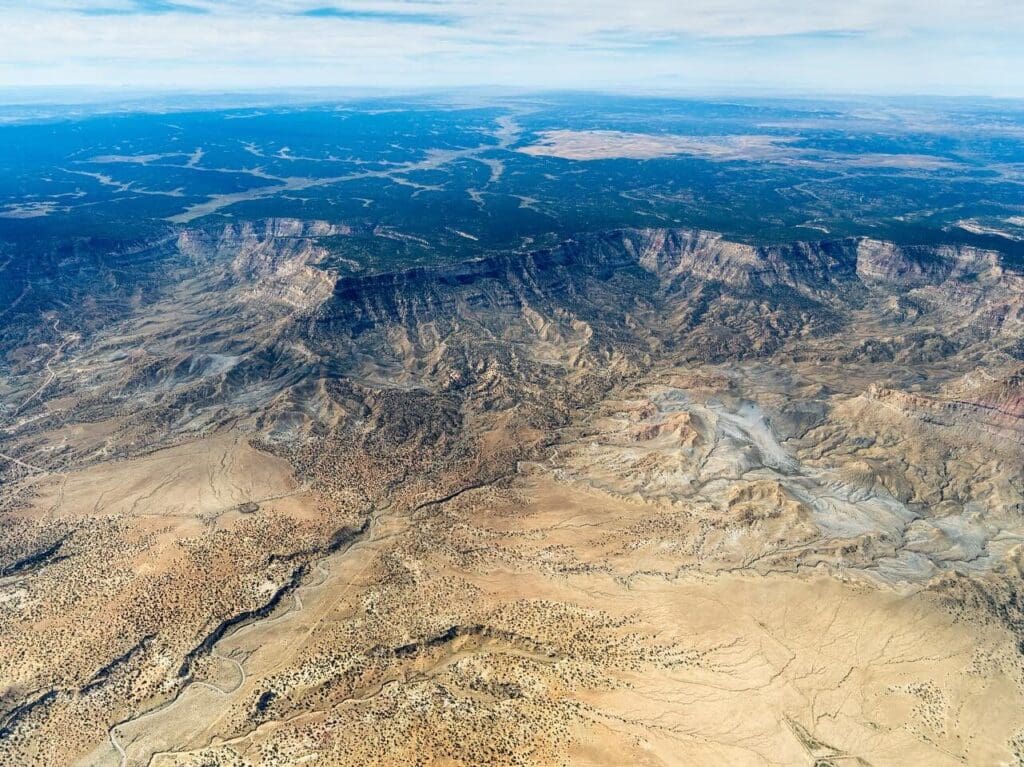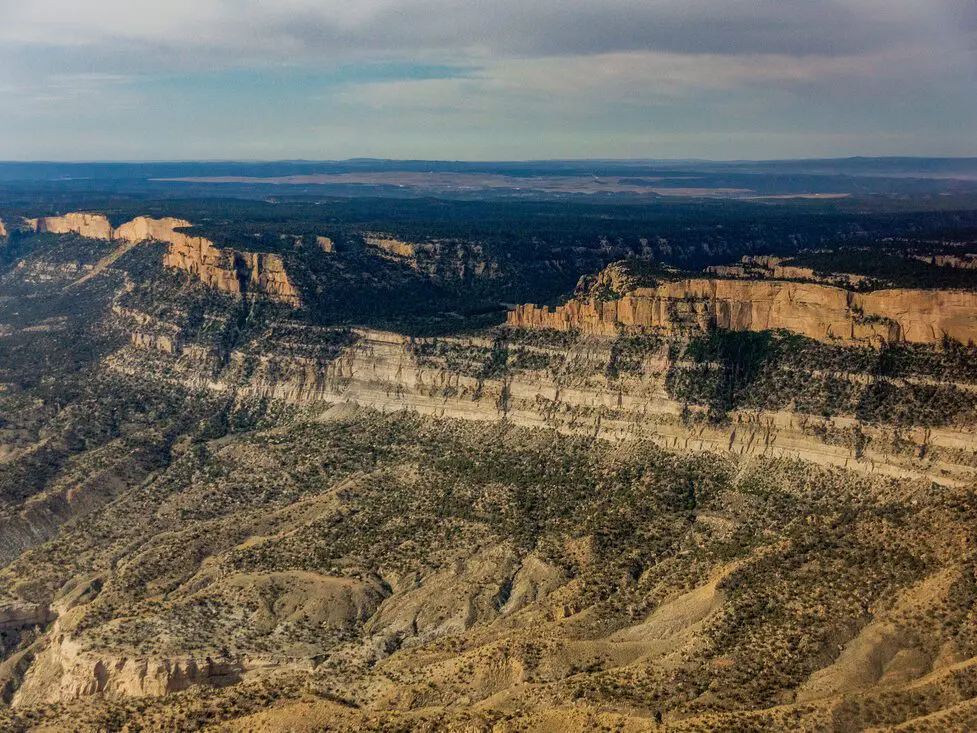For Immediate Release, February 15, 2024
Contact:
Adrian Herder, Tó Nizhóní Ání, (928) 380-3914, a.herder92@gmail.com
Robyn Jackson, Diné C.A.R.E., (928) 228-5805, robyn.jackson@dine-care.org
Taylor McKinnon, Center for Biological Diversity, (801) 300-2414, tmckinnon@biologicaldiversity.org
Federal Officials Reject Three Huge Arizona Pump Storage Projects Targeting Black Mesa
FLAGSTAFF, Ariz.— Heeding widespread community and Tribal opposition, the Federal Energy Regulatory Commission denied preliminary permit applications today for three proposed hydropower projects southeast of Kayenta on the Navajo Nation in Arizona. In denying the applications, commissioners announced a new policy of not issuing permits for projects on Tribal lands without Tribal support.
“The decision affirms recognition that the voice of the Navajo Nation Government and the voice of the Navajo people does matter to the commission. The commission recognizes the arrogance of Nature and People First by not approaching the nation and the people it tried to ram with their application without listening to the people.”
Herb Yazzie, Black Mesa Resident.
“It is encouraging to see federal decision-makers honoring their trust responsibility to Native American Tribes. Historically, that has not been the case,” said Nicole Horseherder, the executive director of the Navajo grassroots group Tó Nizhóní Ání, which is based on Black Mesa, where Nature and People First proposed building their pumped hydro projects. “These projects would have damaged vital groundwater sources that have already been harmed by 50 years of industrial overuse from coal mining.
“That being said, there is still a deep need for economic development on the Nation, and we’re ready to roll up our sleeves and work with tribal communities to develop alternatives that are far more appropriate for our arid region than massive water projects.”
“It’s hard to put all this into words, but we here at Tó Nizhóní Ání could not be happier about this decision. We want to acknowledge everyone who played a crucial role in intervening in this project and the communities of Dził Yíjiin (Black Mesa) for entrusting us with their voices to ensure our lands and waters are protected. Ahéhee’ t’áá’ánółtso! Náásgóó nee’niji’ dooleeł.”
– Adrian Herder, #NoBMPSP Campaign Lead, Tó Nizhóní Ání

The Navajo Nation, Indigenous and conservation groups opposed the Black Mesa North, East and South Pump Storage Projects in part because developers applied for the preliminary permit applications without first getting consent from the Tribe and nearby communities. Groups also opposed the projects on the grounds that they would have destroyed land, displaced people and land uses, further depleted rivers and aquifers, and destroyed pre-historic sites and habitat for endangered species like the Mexican spotted owl. The footprints and water requirements of the projects would have worsened problems caused by decades of coal extraction.
“We’re relieved to learn that all the Black Mesa pump storage proposals submitted to FERC were denied,” said Robyn Jackson with Diné C.A.R.E. “Our sacred female mountain at Black Mesa has been protected. Much gratitude goes to Tó Nizhóní Ání, Center of Biological Diversity and of course federal regulators for denying these horrendous proposals. We’re also relieved that the other pump storage proposals before FERC that would’ve desecrated our sacred Chuska male mountain were also denied, because those too would’ve devastated our biodiversity, Diné communities and culture.”
In their decision, commissioners wrote: “To avoid permit denials, potential applicants should work closely with Tribal stakeholders prior to filing applications to ensure that Tribes are fully informed about proposed projects on their lands and to determine whether they are willing to consider the project development. Here, because the proposed projects are sited entirely on Navajo Nation land and the Tribe has stated that it opposes issuance of the permits, we deny the three applications.”
“Federal officials are absolutely right to require developers to consult with and gain the support of Tribes before issuing permits for projects on Tribal lands,” said Taylor McKinnon, Southwest director at the Center for Biological Diversity. “The demise of these disastrous proposals is a huge win for the people, plants and animals of Black Mesa, and a victory for environmental justice.”
Spanning 40 linear miles on Black Mesa’s northeastern escarpment, the projects would have pumped water uphill to reservoirs atop Black Mesa when electricity prices were low to generate electricity and revenue from return flows to reservoirs below the mesa when prices were higher. The applications listed as potential water sources the aquifers beneath Black Mesa and the Colorado and San Juan rivers despite a lack of evidence showing the availability of or legal rights to those sources.

The projects proposed eight new reservoirs across 38,000 acres, which is about 60% of Lake Powell’s current surface area. Filling them would have required 450,000 acre-feet of water, an enormous share of the remaining Colorado River flows. Even under the rosiest scenario, estimated annual evaporative loss would be up to 8,000 acre-feet annually, which is nearly double the rate of aquifer depletion from historical coal extraction.
Decades of coal mining have already depleted Black Mesa aquifers and their connected seeps and springs. The Colorado and San Juan rivers are over-allocated, and their use is being curtailed as climate change and drought further deplete flows. The aquifers and rivers provide water for people and endangered species like Navajo sedge and Colorado pikeminnows.
“In the past, we applied the general policy of granting permits even where issues were raised about potential project impacts without a distinction for projects on Tribal lands opposed by Tribes. As noted, we have recently revised this policy when permits have been opposed by federal land managers or similarly affected federal agencies. We believe that our trust responsibility to Tribes counsels a similar policy in cases involving Tribal lands and accordingly, we are establishing a new policy that the Commission will not issue preliminary permits for projects proposing to use Tribal lands if the Tribe on whose lands the project is to be located opposes the permit. To avoid permit denials, potential applicants should work closely with Tribal stakeholders prior to filing applications to ensure that Tribes are fully informed about proposed projects on their lands and to determine whether they are willing to consider the project development. Here, because the proposed projects are sited entirely on Navajo Nation land and the Tribe has stated that it opposes issuance of the permits, we deny the three applications.”
FERC ruling
POSITION OF THE NAVAJO NATION
Motion to intervene navajo nation department of justice
Pursuant to 18 C.F.R § 385.214(b)(1), to the extent known by the Navajo Nation based on the
application, the Nation opposes the application on various grounds, including but not limited to:
1. It is unclear to our Departments the level of meaningful consultation that has occurred between the Applicant and Navajo Nation or its political subdivisions.
2. The Applicant did not seek the consent of the Navajo Nation or procure the required clearances and permits for preliminary biological investigations or construction of the Project.
3. The Project may adversely impact the use of these lands by the Navajo Nation and its members.
4. The Project may adversely impact the water rights of the Navajo Nation or the use of the waters of the Colorado River and San Juan River systems, and two unnamed aquifers and their sources.
5. The Project may adversely impact the wildlife and plant resources of the Navajo Nation, including but not limited to the habitat of Mexican Spotted Owls and Golden Eagles.
6. The Project may adversely impact Colorado River and San Juan River fish resources of the Navajo Nation including but not limited to the habitat of Humpback Chub, Razorback Sucker, Colorado Pikeminnow, Roundtail Chub and Bluehead Sucker.
7. The Project may adversely impact the cultural resources of the Navajo Nation.
Tó Nizhóní Ání, Diné Citizens Against Ruining our Environment, and the Center for Biological Diversity filed motions last year urging the commission to reject the Black Mesa hydropower projects.
